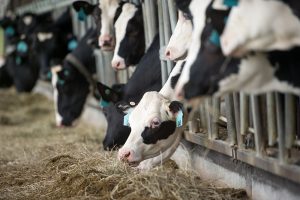Bulletin #1068, Your Responsibility as a Relief Milker When Visiting Another Farm
By Anne Lichtenwalner, DVM, Ph.D., Debra Kantor, Associate Extension Professor, University of Maine Cooperative Extension, and Jacki Perkins, Organic Dairy Specialist, Maine Organic Farmers and Gardeners Association.
Based on work by Richard J. Brzozowski, Program Administrator, University of Maine Cooperative Extension.
For information about UMaine Extension programs and resources, visit extension.umaine.edu.
Find more of our publications and books at extension.umaine.edu/publications/.

Thank you so much for your willingness to lend a hand to a farmer who needs your help. Whenever you visit a farm, you take the risk of contaminating that farm with disease organisms. Of course, this is a two-way street: you also take the risk of bringing pathogens (bacteria or viruses) back to your own home, farm, and livestock. These pathogens can ride along on your boots, clothing, skin, and hair. Help keep farms healthy- please follow these steps:
- Arrive clean. Wear clean coveralls and well-cleaned, disinfected footwear when you arrive at each farm you’re helping. Tie your hair back, or wear a hat while working with animals to keep hair out-of-the-way and clean.
- Leave clean.
- Have a large plastic bag in your vehicle for your dirty boots and coveralls, and be sure you have your “driving shoes” handy so you can change out of dirty boots and coveralls when you get back into the vehicle after your day’s work.
- Keep a plastic tub with clean clothes, extra gloves (dishwashing gloves are ok), paper towels and disinfectant in your vehicle.
- Wash your hands before and after being around animals to avoid getting sick and spreading germs to others.
- Wash hands properly with soap and clean, running water.
- If soap and water are not readily available, you can use an alcohol-based hand sanitizer that contains at least 70% alcohol.
- Because hand sanitizers do not get rid of all types of germs, it is important to wash your hands with soap and water, if they are available, for at least 20 seconds. This should be done:
- Before and after eating
- After sneezing, coughing or nose blowing
- After touching face, hair, cellphone, and/or clothing
- After using the restroom
- Before handling food
- After touching or cleaning surfaces that may be contaminated
- After using shared equipment and supplies
- Before and after being around animals.
- Cleaning footwear before and after being around animals is also important.
- Wear washable (waterproof) footwear.
- Wash all organic matter from boots with water, soap, and a brush.
- Dip clean boots in disinfectant before entering farm buildings or holding areas/pastures/etc.
- Repeat the process before entering your vehicle
- Wear gloves when handling livestock:
- Wear either disposable nitrile gloves provided by the establishment owner, or washable dish gloves if nitrile is unavailable.
- Disinfect gloves frequently: check with the farmer to follow recommended practices. Change/wash gloves between age/milking groups. This prevents disease transfer to vulnerable animals.
- Wear a face-covering:
- Some bacteria that cause animal diseases are carried around by people in their respiratory system, so using a mask can help. If you wear a mask, when you take it off, do so by holding the earloops or ties, and be sure to clean and disinfect it before wearing it again.
- Wearing a mask may help us contain our illnesses, but must be combined with other methods as well.
- Stay at least 6 feet away from other people; cough or sneeze into your elbow; wash hands frequently; if you are ill, stay home
These precautions might seem like a hindrance at first. However, the time spent in preventing disease is worth the effort. Get into the habit of thinking and practicing bio-security.
Information in this publication is provided purely for educational purposes. No responsibility is assumed for any problems associated with the use of products or services mentioned. No endorsement of products or companies is intended, nor is criticism of unnamed products or companies implied.
© 2020
Call 800.287.0274 (in Maine), or 207.581.3188, for information on publications and program offerings from University of Maine Cooperative Extension, or visit extension.umaine.edu.
In complying with the letter and spirit of applicable laws and pursuing its own goals of diversity, the University of Maine System does not discriminate on the grounds of race, color, religion, sex, sexual orientation, transgender status, gender, gender identity or expression, ethnicity, national origin, citizenship status, familial status, ancestry, age, disability physical or mental, genetic information, or veterans or military status in employment, education, and all other programs and activities. The University provides reasonable accommodations to qualified individuals with disabilities upon request. The following person has been designated to handle inquiries regarding non-discrimination policies: Director of Institutional Equity and Title IX Services, 5713 Chadbourne Hall, Room 412, University of Maine, Orono, ME 04469-5713, 207.581.1226, TTY 711 (Maine Relay System).

